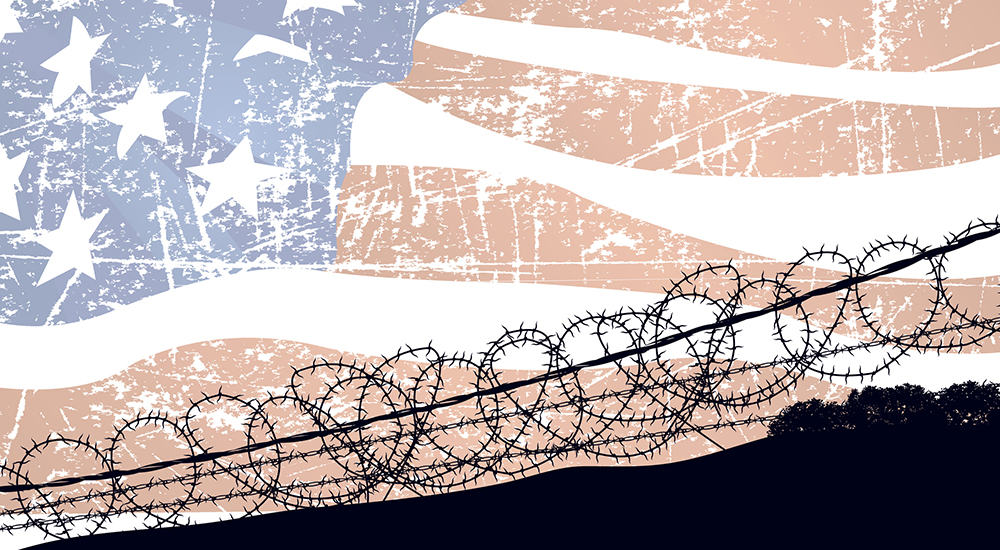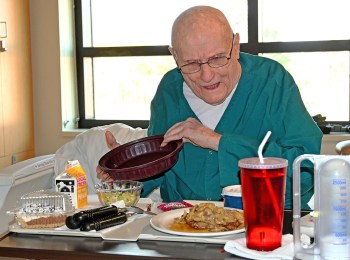In November of 1943, as a stock clerk at the Peterson Boat Works in Sturgeon Bay, Wisconsin, John Moddie signed his name and enlisted in the Army. That was a decision that changed his life in ways no one could have imagined.
After basic training, Moddie was assigned to B Battery, 590th Field Artillery Battalion, 106th Infantry Division at Camp Atterbury, Indiana. The 18-year-old was excited to start something new in life.
He spent a few months learning the ins and outs of the 105mm howitzer, a large, towed, field artillery gun, before packing up his gear and heading to England.
“The ships that brought us over were civilian transports, not naval,” explained the 97-year-old Veteran. “We were only there a short time. We were allowed to go to the local pubs at night but had to be careful due to the blackout conditions we were under. The cars only had small blackout lights on them that were hard to see. We had a few close calls on the way back to the base.”
Action in the Battle of the Bulge
Moddie volunteered to be “second gunner,” a targeting duty on the eight-man crew of the howitzer, earning him a field promotion. The morning of Nov. 30, 1944, Pfc. Moddie and the 590th boarded landing crafts on the English Channel. The small fleet of LSTs (landing ships, tank) crossed the channel to LeHavre, France, and awaited orders to sail up the Seine River.
“That night a massive storm busted the fleet up bad,” he explained. Two ships lost their anchors and spent the next 36 hours floating into the channel and sailing back into the harbor.
“I never knew why we got stuck on the boats for so long and was surprised to find out it was because of the LSTs losing their anchors. It took more than 60 years for me to learn this,” he said. Once they landed, Moddie and his crew of seven were on their way to take part in the Battle of the Bulge.
V-1 flying bombs overhead
As B Battery made its way toward Schnee Eifel, they were strafed by Nazi fighter planes that were quickly dispatched by a pair of P-47 Thunderbolts. Moddie found himself on the front lines late that afternoon and hurried to dig in before dark. It was a long, cold, noisy, miserable night. Besides cold feet and hands, the men were pounded with enemy artillery as V-1 flying bombs soared only about 50 feet above their heads.
“The V-1s sounded strange, like the putt-putt sound of a Model-T Ford engine,” he recalled. Bumper to bumper in their vehicles, the 590th moved through the night. “During the ride, I could see some of the German artillery off in the distance that would fire over our heads. The rounds rained down like shrapnel.”
The two roads back toward Schonberg had fallen into German hands. It was decided the 590th would follow closely with the infantry, hearing little and seeing less. “That night, there was lots of gunfire. That morning we found ourselves in a narrow valley with wooded slopes on both sides and a swampy ground to the front. A small stream was in front of us with stuck vehicles blocking our path… and bodies everywhere,” he said. “We fired the howitzer, starting out with multiple bags of powder for more distance and slowly we’d reduce the amount as the Germans advanced on our position. We only had short breaks in the action to readjust aim as the forward observers reported in. We fired 200 to 300 rounds a day until we were firing point blank.”
Captured in 1944
Command sent word to the gun positions to destroy in place the howitzers and any other equipment that might be used against them and to surrender. German forces had gotten behind them.
Moddie was captured Dec. 19, 1944, along with 25 others.
“We were marched by the Germans through the swampy valley. When we crossed over the hill, out of the valley, I could see the devastation the artillery had caused was massive. We squeezed close to the walls of the buildings in any town we marched through because of the large German tanks passing by us on the tiny roads,” he said.
They were taken to Stalag 9B in Bad Orb, Germany. He was led into a large unheated building with multiple bunk beds, two to five high, covered in straw. “The beds were so lice infested no one bothered to sleep in them,” Moddie said. “This outraged the Germans, and they moved us to another building with no bunks. We spent many days hungry and assisting others in picking the lice and ticks off each other. One day they brought us into a field that was surrounded by machine guns because one of the German soldiers was killed. They gave us an ultimatum to turn in the killer by nightfall or they would just kill everyone. The Germans got the bloodhounds out and found the bloody coat of an American soldier stashed in a snowbank. We didn’t know what happened to him, but he was never seen again.”
Liberated in 1945
On April 2, 1945, Moddie was liberated by allied troops. He woke up that morning to an empty camp and open gates. The Germans had fled through the night rather than be captured by Allied forces. Moddie went from 150 pounds prior to be being captured to about 85 pounds at the time of his release.
He was given coffee and doughnuts from fellow Americans with the Red Cross. He told his family in a letter that he was freed and should be home soon for some of his mom’s home cooking. “I told my mom that once I get home, I never wanted to leave again,” he said.
Moddie was held in the camp, though, to build strength for the trip home and, in early April 1945, began his trek back to the United States. He likes to tell the story about the trip home on the big ships across the Atlantic. When they tried to eat, the ships rode the waves so hard no one could keep food down. “I went to the small store on board and bought a box of Hershey bars. That got me home without any more bouts of seasickness,” he remembered.
After reaching the United States, Moddie was given a two-week furlough in a hotel in Palm Beach, Florida, with a meal card for the hotel restaurant for three meals per day. Once home, he took on many jobs.
“I worked building the mill in Quinnesec, Michigan, two of the shopping malls in Iron Mountain and even worked in the maintenance department at VA,” he said.
Prefers newspaper to TV news
The POW camp survivor married Betty in 1971. They built a home in Quinnesec and had two sons, John and Gary, and a daughter, Betty Ann Stewart.
He enjoys reminiscing about the cars he had “back then.” His favorite was a 1934 Plymouth. “I really liked the style of the car and the little button I could pull that let me stay at the same speed,” he said.
Quick with a joke or advice, Moddie always has a smile on his face. He gets up every morning and walks the length of the Oscar G Johnson VA community living center to pick up his newspaper. He stops for a cup of coffee on his way back, then reads his paper from cover to cover.
Topics in this story
More Stories
Bob Jesse Award celebrates the achievements of a VA employee and a team or department that exemplifies innovative practices within VA.
The Medical Foster Home program offers Veterans an alternative to nursing homes.
Watch the Under Secretary for Health and a panel of experts discuss VA Health Connect tele-emergency care.








When I worked at the VA for 24 years as a service officer. I tried and tried to n get veterans to wright a story about the experiences. Most responded in a normal GI language. A few however did write their story. One who would not write his story verbally told me about his harrowing experience which like
Mr Moddie was during the Battle of the Buldge. Him and 10 Americans were captured. Standing in a
line. A Gerrman officer shot each one in the back of the head. When he got to this individual the gun
was empty. they thn took him to a prision camp. Thank God these two survived their madding experiences. One can not imagine what the thoughts of men of this calibor. Thank you for your brave service.
It is ILLEGAL to injure or kill an enemy after surrendering and being taken alive into PIW status.
Way to go, Moddie ! A friend was in a P.O.W. camp where the personnel had abandoned camp prior to the arrival of Russian troops who liberated the prisoners. The Russians were on their way to Berlin for the final showdown.
Thank you Veteran John Moddie for your contribution and sacrifice that enabled me to be born in a free Country and live out my life since 1946. It’s men like you that have made it possible for men like me to have the wonderful life I’ve been able to enjoy in America. I am a Viet Nam Veteran but never went through anything like you had to endure. I’m so glad you made it back home and congratulate you on your 97 years on this Earth, and hope you have many more years here with us.
Thank you so much for your Service. God Bless you and your family.
A great Legacy History For all to Know!! from our Brave Fellow Veteran Mr.John Moddie, and to all Veterans Today Young and Old to Be Inspirer!!GOD Bless You and Your Family!!
Great story of perseverance God Bless You my fellow Veteran